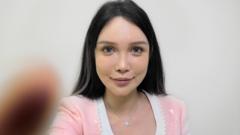With rising demand and changing beauty standards, China's cosmetic surgery industry has exploded, creating a culture where the pursuit of perfection often leads to extreme measures and tragic outcomes.
The Endless Pursuit of Beauty: China's Cosmetic Surgery Phenomenon

The Endless Pursuit of Beauty: China's Cosmetic Surgery Phenomenon
A deep dive into the rise of cosmetic surgery in China, exemplified by influencers like Abby Wu, who have undergone numerous procedures in pursuit of beauty and confidence.
As China's cosmetic surgery industry undergoes an unprecedented boom, figures like Abby Wu—who boasts over 100 operations—represent the complex mix of ambition, confidence, and risk inherent in this growing trend. Abby, who started her surgical journey at a mere 14 years old after experiencing rapid weight gain, recounts her transformative journey not just as a physical alteration, but as a means to bolster her self-esteem. Now a prominent influencer and co-owner of a beauty clinic in Beijing, Abby embodies the duality of empowerment and vulnerability that patients face in this cutting-edge landscape.
With more than 20 million individuals opting for cosmetic procedures yearly, the desire for aesthetic enhancement is largely fueled by women's aspirations to conform to evolving beauty ideals. These standards combine Western influences with the allure of anime and K-Pop aesthetics, pushing many toward drastic procedures like jaw reductions or forehead lifts. Yet, as aspirational as these outcomes may be, they often come at a steep cost, both financially—Abby’s surgeries total around half a million dollars—and physically, with patients like Abby experiencing complications post-procedure.
The shadow of this beauty phenomenon is a proliferation of unlicensed clinics preying on the vulnerable, leading to countless botched surgeries. Notable incidents, such as actress Gao Liu's disastrous nose surgery from an unqualified surgeon, highlight the urgent issues facing the industry. Despite efforts by the Chinese government to regulate these practices, stories of deception and exploitative tactics proliferate, with individuals coerced into surgeries under the guise of job offers or influencer fame.
In this high-stakes climate, social media plays a pivotal role, promoting not just the surgeries themselves but also an unrealistic image of beauty. Beauty apps like SoYoung encourage users, regardless of their extensive surgical history, to seek out “imperfections” that could be “fixed,” perpetuating a cycle of dissatisfaction.
As Abby meets with friends in a chic café, discussions often circle back to the latest surgeries and desired changes, underscoring a shared mentality: an endless quest for an idealized appearance. Despite the physical and emotional toll of numerous procedures, many, including Abby, remain committed to their pursuit, unwilling to accept that the journey of self-improvement might someday conclude. Whether this relentless drive manifests as empowerment or peril, it undeniably continues to shape a new generation's approach to beauty in China.






















